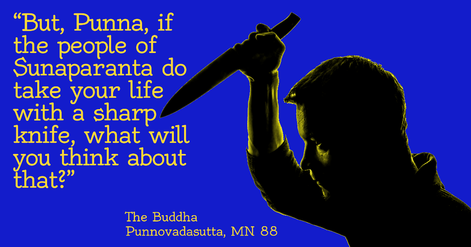 Puṇṇa Sutta Then the Venerable Puṇṇa approached the Blessed One … and said to him: “Venerable sir, it would be good if the Blessed One would teach me the Dhamma in brief, so that, having heard the Dhamma from the Blessed One, I might dwell alone, withdrawn, diligent, ardent, and resolute.” “Puṇṇa, there are forms cognizable by the eye that are desirable, lovely, agreeable, pleasing, sensually enticing, tantalizing. If a bhikkhu seeks delight in them, welcomes them, and remains holding to them, delight arises in him. With the arising of delight, Puṇṇa, there is the arising of suffering, I say. There are, Puṇṇa, sounds cognizable by the ear … mental phenomena cognizable by the mind that are desirable, lovely, agreeable, pleasing, sensually enticing, tantalizing. If a bhikkhu seeks delight in them, welcomes them, and remains holding to them, delight arises in him. With the arising of delight, Puṇṇa, there is the arising of suffering, I say. “Puṇṇa, there are forms cognizable by the eye … mental phenomena cognizable by the mind that are desirable, lovely, agreeable, pleasing, sensually enticing, tantalizing. [61] If a bhikkhu does not seek delight in them, does not welcome them, and does not remain holding to them, delight ceases in him. With the cessation of delight, Puṇṇa, there is the cessation of suffering, I say. “Now that you have received this brief exhortation from me, Puṇṇa, in which country will you dwell?” “There is, venerable sir, a country named Sunāparanta. I will dwell there.” “Puṇṇa, the people of Sunāparanta are wild and rough. If they abuse and revile you, what will you think about that?” “Venerable sir, if the people of Sunāparanta abuse and revile me, then I will think: ‘These people of Sunāparanta are excellent, truly excellent, in that they do not give me a blow with the fist.’ Then I will think thus, Blessed One; then I will think thus, Fortunate One.” “But, Puṇṇa, if the people of Sunāparanta do give you a blow with the fist, what will you think about that?” “Venerable sir, if the people of Sunāparanta give me a blow with the fist, then I will think: ‘These people of Sunāparanta are excellent, truly excellent, in that they do not give me a blow with a clod.’ Then I will think thus, Blessed One; then I will think thus, Fortunate One.” “But, Puṇṇa, if the people of Sunāparanta do give you a blow with a clod, what will you think about that?” “Venerable sir, if the people of Sunāparanta give me a blow with a clod, then I will think: ‘These people of Sunāparanta are excellent, truly excellent, in that they do not give me a blow with a rod.’ [62] Then I will think thus, Blessed One; then I will think thus, Fortunate One.” “But, Puṇṇa, if the people of Sunāparanta do give you a blow with a rod, what will you think about that?” “Venerable sir, if the people of Sunāparanta give me a blow with a rod, then I will think: ‘These people of Sunāparanta are excellent, truly excellent, in that they do not stab me with a knife.’ Then I will think thus, Blessed One; then I will think thus, Fortunate One.” “But, Puṇṇa, if the people of Sunāparanta do stab you with a knife, what will you think about that?” “Venerable sir, if the people of Sunāparanta stab me with a knife, then I will think: ‘These people of Sunāparanta are excellent, truly excellent, in that they do not take my life with a sharp knife.’ Then I will think thus, Blessed One; then I will think thus, Fortunate One.” “But, Puṇṇa, if the people of Sunāparanta do take your life with a sharp knife, what will you think about that?” “Venerable sir, if the people of Sunāparanta take my life with a sharp knife, then I will think: ‘There have been disciples of the Blessed One who, being repelled, humiliated, and disgusted by the body and by life, sought for an assailant. But I have come upon this assailant even without a search.’ Then I will think thus, Blessed One; then I will think thus, Fortunate One.” “Good, good, Puṇṇa! Endowed with such self-control and peacefulness, you will be able to dwell in the Sunāparanta country. Now, Puṇṇa, you may go at your own convenience.” Then, having delighted and rejoiced in the Blessed One’s statement, the Venerable Puṇṇa rose from his seat, paid homage to the Blessed One, [63] and departed, keeping him on his right. He then set his lodging in order, took his bowl and outer robe, and set out to wander towards the Sunāparanta country. Wandering by stages, he eventually arrived in the Sunāparanta country, where he dwelt. Then, during that rains, the Venerable Puṇṇa established five hundred male lay followers and five hundred female lay followers in the practice, and he himself, during that same rains, realized the three true knowledges. And during that same rains he attained final Nibbāna. Then a number of bhikkhus approached the Blessed One … and said to him: “Venerable sir, the clansman named Puṇṇa, who was given a brief exhortation by the Blessed One, has died. What is his destination? What is his future bourn?” “Bhikkhus, the clansman Puṇṇa was wise. He practised in accordance with the Dhamma and did not trouble me on account of the Dhamma. The clansman Puṇṇa has attained final Nibbāna.” How to cite this document: © Bhikkhu Bodhi, The Connected Discourses of the Buddha (Wisdom Publications, 2000) This selection from The Connected Discourses of the Buddha by Bhikkhu Bodhi is licensed under a Creative Commons Attribution-NonCommercial-NoDerivs 3.0 Unported License. Based on a work at http://www.wisdompubs.org/book/connected-discourses-buddha. Permissions beyond the scope of this license may be available at http://www.wisdompubs.org/terms-use. Comments are closed.
|

|
LocationMahamevnawa Buddhist Monastery Winnipeg at the Buddha Meditation Center Winnipeg 2610 St Mary’s Road, Winnipeg, MB R2N 4A2 204 869 5272 info@MahamevnawaWinnipeg.org We sometimes take photos of our events and post them on our website. If you would like us to take down any images you appear in across any of our platforms, please let us know and we will be happy to remove them. |
Learning
Quick Links
Our Branches
We gratefully recognize that our monastery rests on the traditional territory of Anishinaabeg, Cree, Oji-Cree, Dakota, and Dene peoples, and the homeland of the Métis Nation.
|
 RSS Feed
RSS Feed

